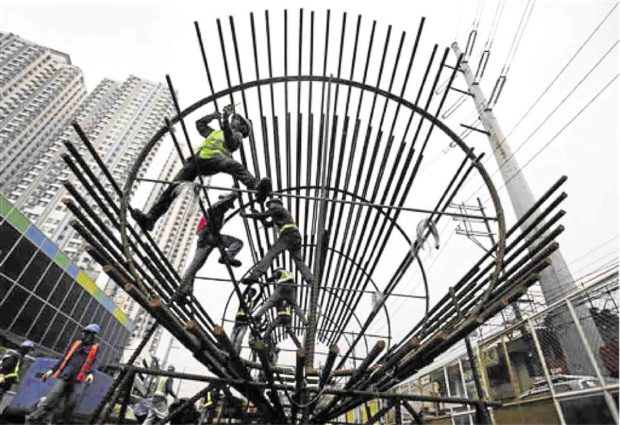Robust infra spending up to ’24 set
Since the implementation of several projects under President Duterte’s ambitious “Build, Build, Build” will spill over beyond his term, his economic team has programmed yearly infrastructure spending above P1 trillion, or over 5 percent of gross domestic product (GDP), up to 2024.
The Cabinet-level Development Budget Coordination Committee targeted infrastructure spending this year at P1.02 trillion, equivalent to 5.1 percent of GDP. This public infrastructure program included projects to be rolled out by the national government and local governments and infrastructure equity or subsidy to be injected into state-run corporations.
Next year, infrastructure spending is seen to rise to P1.25 trillion, or 5.7 percent of GDP.
For 2023, spending was set at P1.26 trillion, or 5.2 percent of GDP. It will further increase to P1.32 billion or 5 percent of GDP in 2024.
Cable car system eyed
In a statement on Friday, the Department of Finance (DOF) said Secretary Carlos Dominguez III recently met with French Ambassador to the Philippines Michèle Boccoz and they discussed the possibility of France financing the planned urban cable car system, which would be the first not only in the Philippines but also in Asia.
Article continues after this advertisementThe DOF quoted Boccoz as telling Dominguez that “France is willing to provide financing support through a highly-concessional loan.”
Article continues after this advertisementThe National Economic and Development Authority (Neda) documents had shown that its Investment Coordination Committee’s (ICC) technical board was currently reviewing 26 projects, including the P4.85-billion, 4.5-kilometer cable car project in the Santolan-Eastwood-Pasig corridor. The feasibility study for this upcoming project to be rolled out by the Department of Transportation (DOTr) was funded by a grant from France in 2018, the DOF noted.
112 projects in pipeline
The World Bank, meanwhile, said it prolonged by a couple of years the expiry of the loan it approved in 2014 for the long-delayed Cebu bus rapid transit (BRT) project.
“Though implementation was recently affected by the COVID-19 pandemic, the DOTr continued to move the project forward despite serious constraints and is determined to meet the goal of starting BRT partial operations (package one) by December 2021. Project implementation will go beyond the current loan expiry date of June 30, 2021; the World Bank closing date will be extended by two years to June 30, 2023,” the Washington-based multilateral lender said.
Last Tuesday, Socioeconomic Planning Secretary and Neda chief Karl Kendrick Chua said 30 projects would be turned over for implementation by the next administration in 2022 so it would have a ready pipeline to sustain robust infrastructure spending needed to help the economy recover from the pandemic-induced recession.
Chua said the Neda Board recently increased to 112 its pipeline of big-ticket infrastructure flagship projects under “Build, Build, Build” from the 104 worth a total of P4.1 trillion it approved in August last year.
Chua told the Inquirer that presidential adviser on flagship programs and projects Secretary Vivencio Dizon would announce the total project cost and details of the updated “Build, Build, Build” pipeline.
Of the 112 projects, 51 were already being constructed, 31 projects were in the pre-construction stage, and 17 projects were currently being processed by the ICC. Dominguez and Chua co-chairs the ICC-Cabinet Committee. INQ
